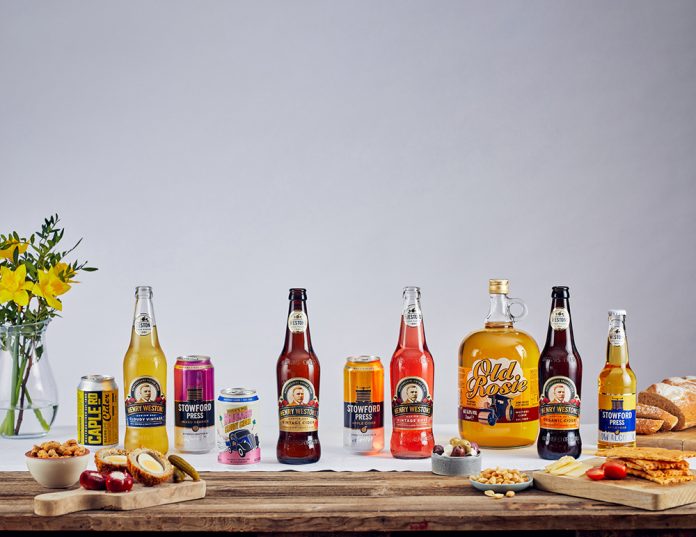Rooted in the soil of Herefordshire for five generations now, multi-award winning Westons Cider is wedded to the countryside it cherishes.
By HELEN COMPSON
“We are passionate about the environment where we both live and work,” said Darryl Hinksman, head of business development. “Looking after it is important to us and to our brand.”
DEFRA minister Victoria Prentis, who holds the remit for beer and cider, paid a visit recently.
During her tour, she took a look at the reed bed filtration plant, used to clean waste water, that covers around 10 acres of Westons’ headquarters near the village of Much Marcle, and the main office block, built a decade ago, which is covered in solar panels to power the lighting and computer usage within.
The ethos of closing the loop with sustainable practices is very much at the heart of this family business. In 2019, Westons began sending the pomace – the stuff left over after apple pressing – to anaerobic digester-owning BioCarbonics Ltd.
As a side note, BioCarbonics, supplier in turn of high-quality green CO2 for the carbonation of bottled and canned drinks, is a joint venture between J V Energen and the Duchy of Cornwall.
Hence Prince Charles opened Energen’s newly installed CO2 capture facility near the Duchy of Cornwall’s Poundbury development in Dorset in June.
The fact one of the venture’s anaerobic digesters is just six or seven miles down the road from Westons has ended the need to bring CO2 all the way from Teesside.
The premium cider company is currently working on the other half of that particular equation by installing a new production line that will allow canning to be brought in-house – under the same roof as its bottling and keg-filling plants – for the first time.
And in another improvement, the plastic rings that used to hold four cans together have also been replaced with a recyclable cardboard version.
That surfaced as being an important detail for some of its key customers, Tesco, Sainsbury and the Co-op among them.
Behind the scenes, perhaps the most important element of all, in terms of sustainability, is quietly taking shape. Darryl said: “As a leadership team we have just appointed consultants who are working with us on a road map to becoming carbon neutral.
“They are gathering the information now and then they will set our route, telling us when we can become carbon neutral and what we have to do to get there.”
Westons proved equally adaptable and responsive to the times when ‘sustainability’ took on the added dimension of ‘sustaining the business’ in the eye of the pandemic.
Within weeks of its descent, the management team had ramped up the online business 20 fold, all the while adjusting the nature of the stock they held.
Darryl said: “From March last year, when we first went into lockdown, we met as a leadership team every day for the first hundred days.
“We made a lot of changes! We worked through the whole process, from the production line to the focus of our stock-keeping.”
Westons was forewarned and as a result, forearmed, when Darryl got a taste of things to come in early 2020. He was in Australia, looking after the company’s antipodean brewery, when Covid-19 began to emerge.
“I flew out of Melbourne just as it went into lockdown and I got back saying ‘we are going to follow suit’,” he said.
“There was an almost instant recognition that business had to change and we pretty much got on with it.”
In a sure indication the team did indeed find the sweet-spot for consumers suddenly house-bound, Westons’ online turnover of yesteryear, somewhere in the region of £50,000 to £100,000 per annum, has become £1.5m.
While the online takings are small beer in the scale of things – the business as a whole has an annual turnover of £60m – the team recognises the shift forced on consumer trends in the past year is here to stay.
“OK, yes, the on-site business is coming back pretty swiftly as pubs and restaurants reopen,” said Darryl. “The recent spurt of good weather has certainly helped there and each time there is a lifting of restrictions, we see a bit of an uplift.
“But with the way the online orders are flowing in, they will soon account for 2.5% of our overall turnover.
“Our best guess is that while people are returning to pubs and restaurants, they will probably go out less often, but will expect a premium offer when they do. For us that means they will drink less, but choose the best.”
Established in 1880, the company is now in the care of the fourth and fifth generations of the Weston family. Managing director Helen Thomas is the great-granddaughter of founder Henry Weston.
Using the wide variety of regional fruit grown in the surrounding orchards, Henry started pressing and blending the ciders and perries that went down a treat with his thirsty neighbours.
Today The Bounds, the charming 17th century farmhouse and cider mill where it all began, is still at the centre of the business.



